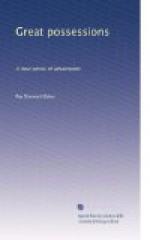Presently, as one who learns to navigate still water near shore longs for more thrilling voyages, I tried the grassy old roads in the woods, where young trees and other growths were to be found in great variety: and had a joy of it I cannot describe, for old and familiar places were thus made new and wonderful to me. And when I think of those places, now, say in winter, I grasp them more vividly and strongly than ever I did before, for I think not only how they look, but how they taste and smell, and I even know many of the growing things by the touch of them. It is certain that our grasp of life is in direct proportion to the variety and warmth of the ways in which we lay hold of it. No thought no beauty and no joy.
On these excursions I have often reflected that if I were blind, I should still find here unexplored joys of life, and should make it a point to know all the friendly trees and shrubs around about by the taste or smell or touch of them. I think seriously that this method of widening the world of the blind, and increasing their narrower joys, might well be developed, though it would be wise for such as do take it to borrow first the eyes of a friend to see that no poison ivy, which certain rascally birds plant along our fences and hedges, is lurking about.
Save for this precaution I know of nothing that will injure the taster, though he must be prepared, here and there, for shocks and thrills of bitterness. A lilac leaf, for example, and to a scarcely lesser degree the willow and the poplar are, when bitten through, of a penetrating and intense bitterness; but do no harm, and will daunt no one who is really adventurous. There is yet to be written a botany, or, better yet, a book of nature, for the blind.
It is by knowing human beings that we come to understand them, and by understanding them come to love them, and so it is with the green people. When I was a boy in the wild north country trees were enemies to be ruthlessly fought—to be cut down, sawed, split, burned—anything to be rid of them. The ideal in making a home place was to push the forest as far away from it as possible. But now, when I go to the woods, it is like going among old and treasured friends, and with riper acquaintance the trees come to take on, curiously, a kind of personality, so that I am much fonder of some trees than of others, and instinctively seek out the companionship of certain trees in certain moods, as one will his friends.
I love the unfolding beeches in spring, and the pines in winter; the elms I care for afar off, like great aloof men, whom I can admire; but for friendly confidences give me an apple tree in an old green meadow.
[Illustration: For friendly confidences give me an apple tree in an old green meadow.]
In this more complete understanding I have been much aided by getting hold of my friends of the hedges and hills in the new ways I have described. At times I even feel that I have become a fully accepted member of the Fraternity of the Living Earth, for I have already received many of the benefits which go with that association; and I know now for a certainty that it makes no objection to its members because they are old, or sad, or have sinned, but welcomes them all alike.




